Effective work management is an orchestra that brings vital processes, projects, tasks, and resources together in perfect harmony. The best way to synchronize all the essential elements of your business is to use an effective work management system to keep everyone communicating, organized, and on top of their performance.
This guide introduces the concept of work management, its benefits, how it compares with project management, and how to use monday work management software to streamline your business operations.
What is work management?
Work management is the practice of planning, organizing, executing, and tracking work activities within an organization to achieve specific goals efficiently. It clarifies who oversees and coordinates tasks, resources, timelines, and deliverables and how they plan to handle these critical work components.
The work management process
The beauty of work management is that it’s entirely customizable to fit your workflows and business goals. Typically, you’ll follow this three-step process:
Step 1. Set goals and OKRs
Base these on your business priorities, or anticipated needs.
Read: Setting OKRs & setting work goals
Step 2. Define projects and business processes
Get 360° visibility into your overall work management process to ensure seamless workflows.
Read: Improve business processes & setting project objectives
Step 3. Plan resources and create tasks
Assign them to specific teams, sub-teams, or individuals.
Read: Guide to resource planning
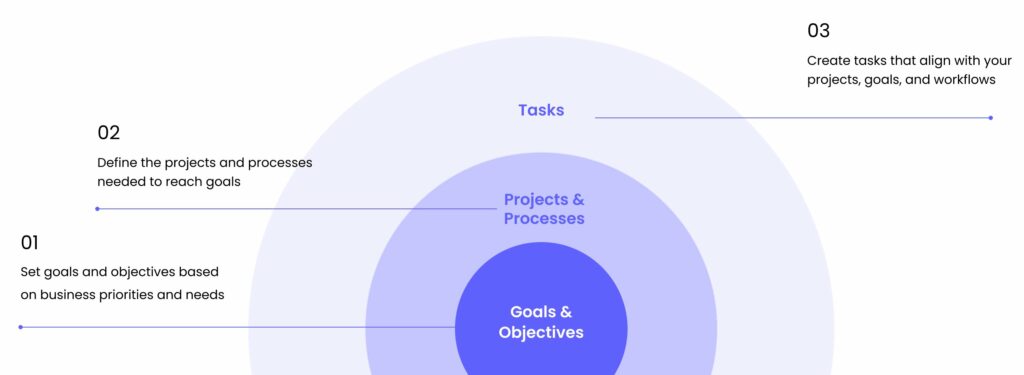
Work management vs. project management
Work management and project management are two terms you may hear interchangeably, but there are clear differences between them.
- Project management is just one aspect of work management. It focuses on specific projects with a clear start and end date or goal, such as launching a new website or product.
- Work management may include project management but is broader and more fluid. Organizations can also use work management to improve processes outside of projects, for example, planning onboarding sequences, automating customer service workflows, or improving communication with vendors.
Read more: Work management vs project management
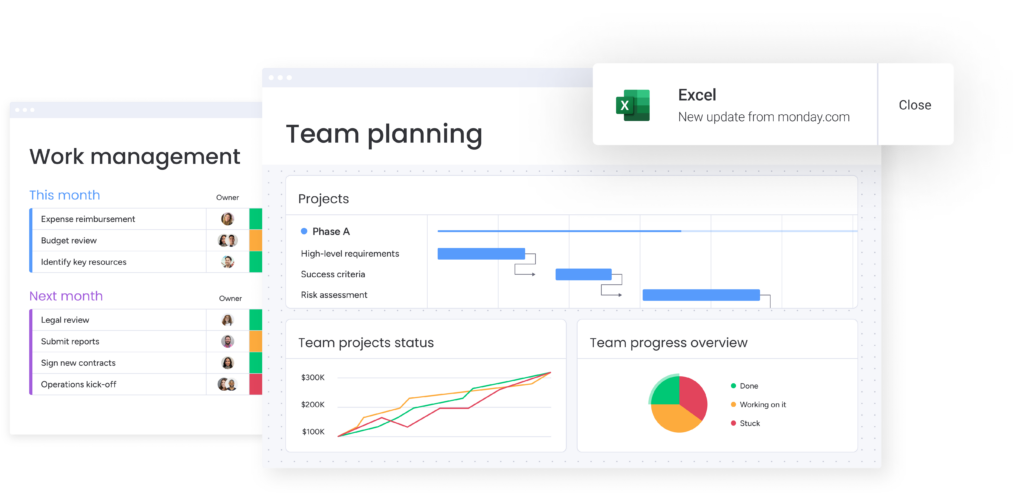
What is a work management software?
Work management software allows teams to manage key work processes like goal setting or viewing project progress from a single, central location. The most user-friendly work management platforms like monday work management use no-code building blocks, enabling teams to design custom workflows for any organizational process. Whether for daily tasks, or large-scale projects, work management platforms provide everything you need to work smarter and more efficiently.
What challenges does work management address
Successful work management helps teams overcome common challenges in their business, which might include:
Resource allocation
Business resources such as people, skills, tools, budgets, or other physical assets are required to complete your work. Work management ensures you plan the precise resources you need to run your business, never wasting or burning through them.
User accountability
Imagine a sales team waiting on a product team update before they can pitch to a large corporation. But no one knows which team member should provide these crucial product updates or when they plan to do so. The sales team must either delay their pitch or present without the necessary details to make a sale. Work management systems allow you to set individual responsibilities so everyone knows who is in charge of specific tasks and is accountable for the work.
Budget restrictions
Rising inflation, layoffs, and supply chain disruption impact company budgets as labor and raw material costs increase exponentially. For example, a Willis Towers Watson report expected salary budgets to increase by 4.1% during 2023, the highest increase since 2008. Work management processes ensure you make the most of every dollar you invest in your operations by tracking budgets, and forecasting profit and loss.
Siloed teams
When departments don’t communicate and are misaligned, this creates knowledge silos where critical information becomes stuck. Data from Aberdeen revealed that a contact center with 200 agents lost $1.5 million annually in labor costs due to knowledge silos.
Work management streamlines communication so everyone can access the information they need to be productive in their roles.What are the main benefits of work management
Designing efficient work management systems leads to the following benefits:
Improves collaboration
Effective work management is transparent, so no one feels in the dark about the status of project objectives or task list. Using a work management platform, all stakeholders have visibility into the data they need to complete their assignments and make the best decisions for the business. This transparency encourages collaboration within teams and across departments, resulting in smooth and efficient workflows with quality results for your business and customers.
This exceptional communication results in fewer misunderstandings, too, which is essential for success. As New York Times Bestseller author Greg McKeown puts it,
“When the misunderstanding is high, the productivity is low, and the costs are high!”
Reduces bottlenecks and delays
Careful planning brings agility to your business. When your teams know what they need and communicate effectively, they become accountable for the work, making it easier to anticipate and overcome any bottlenecks in your processes.
Deliver better results for clients
The right work management software allows you to visualize the progress of your tasks, projects, or processes. You’ll identify any areas where your teams need support or additional resources, enabling you to adjust your workflows before productivity or customer service takes a hit.
Which teams can benefit from a work management solution?
A work management solution can be a game-changer if you need to plan or collaborate within your team or interdepartmentally with other teams. Some examples of how different types of teams use work management tools include:
- Marketing: Plan campaigns, track budgets, and resources
- PMO: Connect strategy to execution and track portfolio management across your organization
- IT: Automate and track technical tasks, along with service requests
- HR: Track processes such as onboarding, recruitment, and training
- Finance: Monitor operational costs and budgets
Check out our tailored solutions for marketing work management and PMO work management.
What processes are a part of monday work management?
Work management can seem abstract until you see it in action. It boils down to managing key processes from one centralized location, such as our powerful monday work management platform. This is where organizations, managers, and executives can streamline the following processes to reach shared goals faster and at scale:
- Project management: Plan and collaborate on any project or portfolio in real-time
- Task management and to-do lists: Assign tasks, set deadlines, and monitor progress or completion
- Client projects: Keep your client work on track by balancing team capacity to meet your goals
- Business operations: Streamline workflows such as supply chain management, or operating budgets
- Resource management: Maximize the efficiency of any type of resource with easy planning, scheduling, and allocating capabilities
- Project Portfolio management: Gain high-level visibility into ongoing projects
- Goals and strategy: Identify team or company-level goals, set OKRs and devise a plan to meet them
- Requests and approvals: Use built-in forms to grant requests and approvals to keep your projects moving forward
Gain visibility into core business processes with these monday work management features
monday work management makes it easy to focus on the processes that matter to your business. The highly customizable design ensures you have what you need at your fingertips by using the following features:
- Views: Visualize your tasks and processes based on the best fit for your workflow. monday work management offers 15+ different views, such as our Gantt or Kanban charts, to stay on top of your workflow’s scope, milestones, dependencies, and more. Additionally, our Workload View lets you balance team resources and quickly respond to shifting priorities.
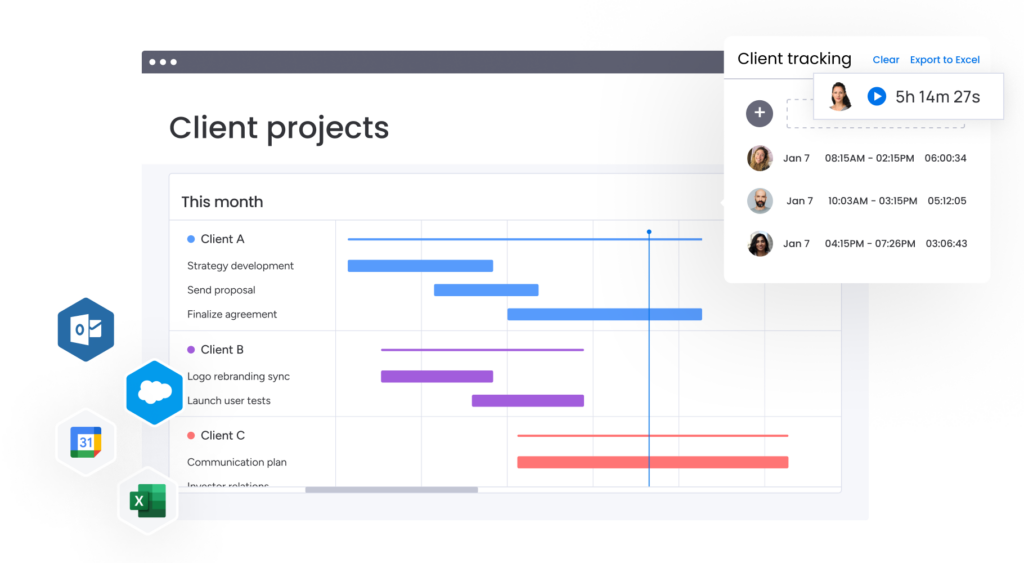
- Time tracking: Record how long a project or process takes, allowing you to plan efficiently for similar future work.
- Dashboards: Gain real-time insights by building customized dashboards to drive your decision-making. Choose from 30+ widgets to display specific information on team workloads, schedules, performance breakdowns, budgets, and more.
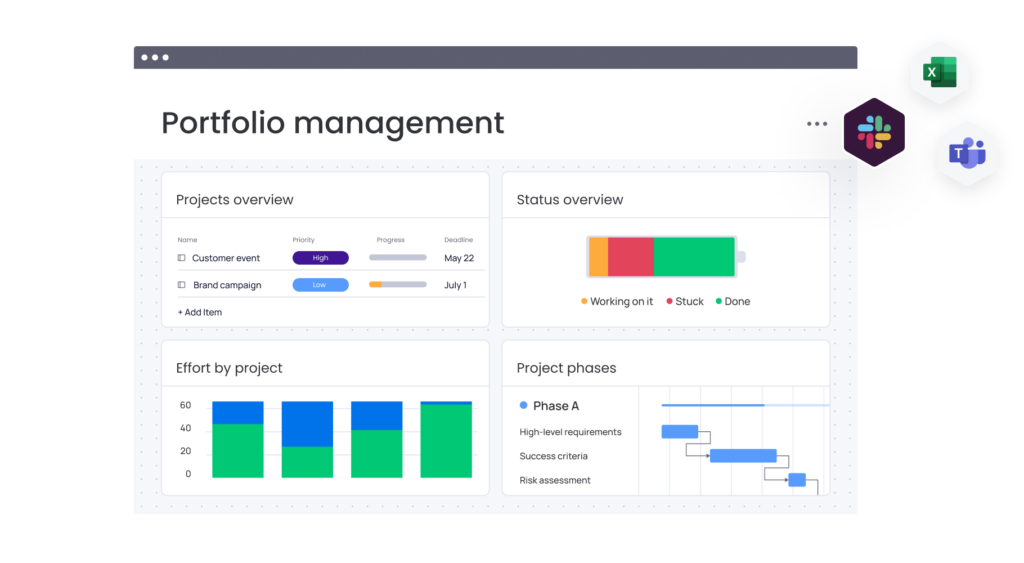
- Intuitive forms: Collect vital request and approval details, allowing you to liaise effectively with stakeholders, third-party vendors, or any other key collaborators that keep your workflows moving.
- Custom workflows: Create the exact workflow you need to meet your business needs. monday work management uses no-code building blocks to suit any team.
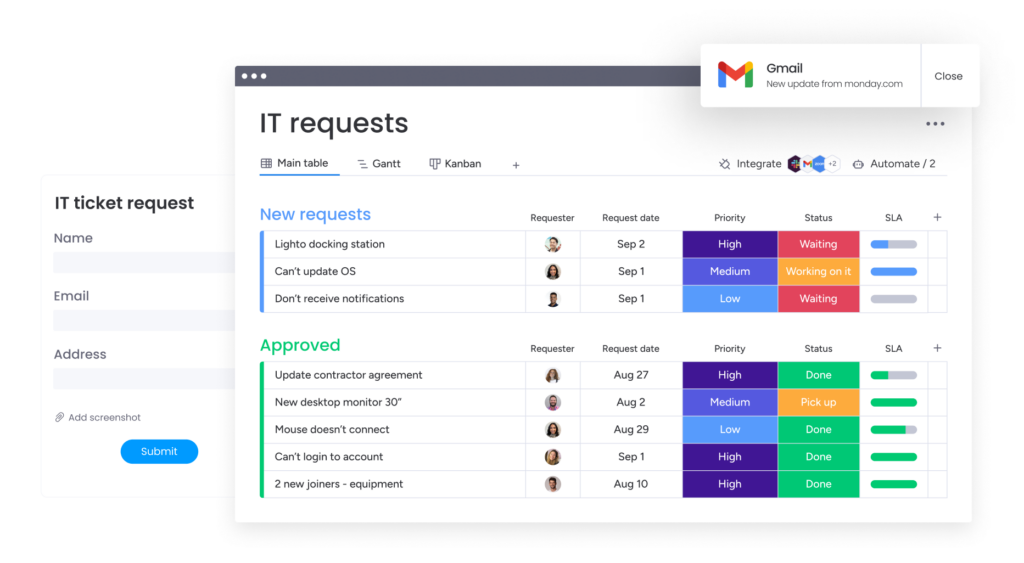
- Automation: Eliminate repetitive tasks by designing automated workflows based on conditional logic. Choose from 200+ pre-built automation recipes to improve efficiency across your business.
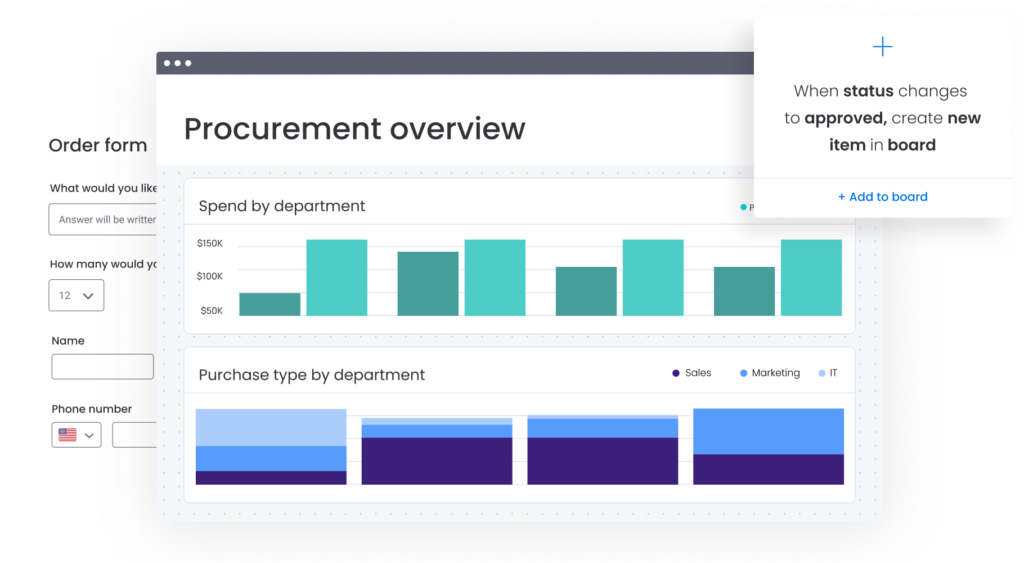
- Integrations: Connect your most important third-party tools, such as Zoom, Slack, Google Drive, and more. Set up any integration in just a few clicks, with no coding knowledge required.
FAQs
What is monday work management?
monday work management enables organizations, managers, and executives to collaborate and reach shared goals at speed. It allows you to design winning business strategies, streamline crucial processes, and plan exceptional projects. Use our powerful building blocks, including automation and dashboards, to create any workflow for any work process.
What can I manage with monday work management?
monday work management enables you to organize any type of work, project, or task within your business. Manage client projects, to-do lists, portfolios, goal-setting, resources, operational budgets, approvals, and anything else from a central location.
What are the advantages of combining work management with project management?
Combining work management and project management increases visibility into your projects’ progress and how they fit into your overall business goals. This combination enables effective communication between team members, ensuring everyone is on the same page and identifying potential bottlenecks before they become an issue. Additionally, it provides individual or team accountability, ensuring that all tasks are completed on time.
Plan and execute your business strategies with monday work management
Effective work management will inspire collaboration in any business. Bring your teams together to maximize your resources, plan your projects to perfection, and design smooth operational processes that run on autopilot.
monday work management is an outstanding feature-rich solution with all the building blocks you need to manage and track your business objectives. Get started today, and watch as you make quick work of the most complex tasks.
 Get started
Get started 
